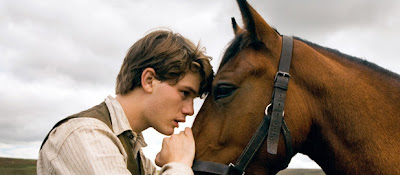I don't usually do this whole "rebut someone else's thinkpiece" thing, because I figure if you're bothering to publish a thinkpiece, you've put more thought into its topic while writing it than I did while reading it. But I can't leave this one alone.
Steven Hyden is one of my favorite music critics. Top five in the world for my money. His thinkpieces are generally excellent and do what only the best can do – they present me with an idea I'd never thought about before and convince me that it's unequivocally true. That's what was so disturbing about Tuesday's
"The year of no Important Albums (and many Good Records)" on the A.V. Club. To boil it down to its essence, Hyden posited that unlike the past few years, 2011 lacked a truly important album, defined as such:
"What’s an Important Album? It’s an album that is perceived to be a momentous work of ambition, invention, and high artistic credibility before it is released, and then proves to actually be so, planting itself in a highly visible place in the culture and acting as a signifier for the year in retrospect. It's the one album you can't avoid hearing about at the end of the year to an almost annoying degree; 'Important' in this context can be taken to mean 'legitimately great' or 'incredibly gas-baggy.' But either way, an Important Album stands apart from the pack as a year-defining work."
He went on to say PJ Harvey's Let England Shake felt like homework, explain how this year lacked a Merriweather Post Pavilion or a My Beautiful Dark Twisted Fantasy, and, while he stopped well short of hating on years without important albums, he steadfastly stood behind the idea that 2011 was one.
I have some problems with this. First of all, the criteria for Important Album is pretty weak here. It's based largely on the idea that lots of critics agreeing that an album is great makes it matter, which even as a critic is a little weird to me. Sure, My Beautiful Dark Twisted Fantasy is important, but the answer to why it is shouldn't be "Because we all liked it a lot and everyone heard it." That's a start, but there has to be more to it than that. I don't think there should be any standard criterion for what makes an album important. All albums carry the potential to matter, and what they bring to the table that we haven't seen brought before, combined with how they're received and talked about, can create a thousand unique paths to importance.
At the crux of my beef with Hyden's suggestion that there are no important 2011 albums is my belief that there are. For the sake of illustrating my point, here's just a few, with my quick takes why they matter:
Lou Reed & Metallica, Lulu and Jay-Z and Kanye West, Watch the Throne
In two very different ways, Lulu and Watch the Throne taught us about something my colleague Steven Arroyo and I coined "collaboratorial hubris" in a podcast we did a couple months ago. Lulu was two past-their-prime-but-once-legendary acts colliding, with all involved calling it their proudest moment. Watch the Throne was two top-tier rappers getting together to have some fun. Both revealed that high-profile collabs are usually ego trips and not artistic revelations. Watch the Throne gave us "Niggas in Paris" and "No Church in the Wild;" Lulu gave us "Junior Dad;" both gave us a reason to never want our heroes to collaborate and hype said collaborations through the roof.
PJ Harvey, Let England Shake
Along with the unequivocally unimportant Bon Iver, Bon Iver, this was 2011's best-loved album. It's important for England. I want to leave it at that. What better album can England stand behind as a piece of the national canon? London Calling? Anything else? The West's asleep. Let England shake.
Fucked Up, David Comes to Life
An A.V. Club commenter with some pent-up snark argued on Hyden's article that this album was so acclaimed because it was important, and while I don't see that as a problem, they're probably right. I've said it a million times, but this punk-as-revolt-against-punk thing matters in 2011, as well as being the best record of the year.
Adele, 21
I don't particularly like that this album matters, but the fact that it sold better than any other album in 2011 says a lot about our priorities as a worldwide music-consuming community. The canon now must be revered. Subversiveness is not rewarded at the record store like it is on Pitchfork, plain and simple. Congratulations, Adele. You've dethroned autotune pop sleaze, but you've also dethroned innovation.
Liturgy, Aesthethica, Wolves in the Throne Room, Celestial Lineage, and Leviathan, True Traitor, True Whore
Three American black metal releases this year matter. Aesthethica was the ultimate debate-starter and apparently the album with the biggest crossover appeal. Celestial Lineage got an A.V. Club "A" and a Pitchfork Best New Music but sadly lost steam at year-end list time. Doesn't matter. It showed a band operating relatively within genre-safe limitations and still appealing to more than just the usual suspects. True Traitor, True Whore matters because it pushes art/artist separation to a whole new level. It's like Roman Polanski making a child rape movie or Michael Vick comparing his on-field performance to a dogfight. Making this violent, angry, brilliant album after being accused of sexual abuse was boneheaded but bold, and it made a lot of us grapple with issues we'd rather not grapple with. Well done, I guess, Wrest.



















